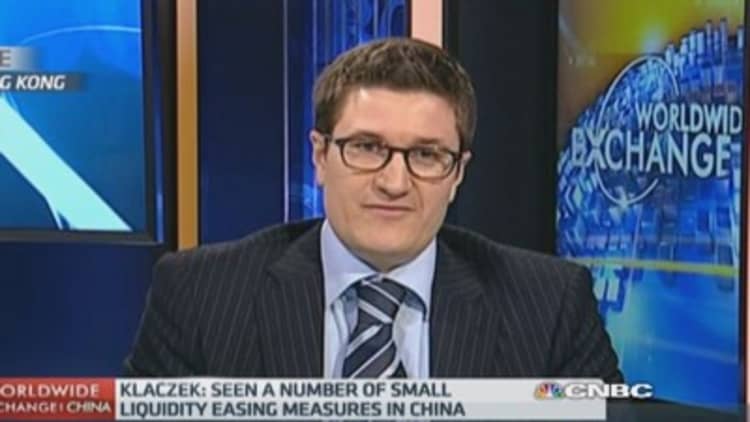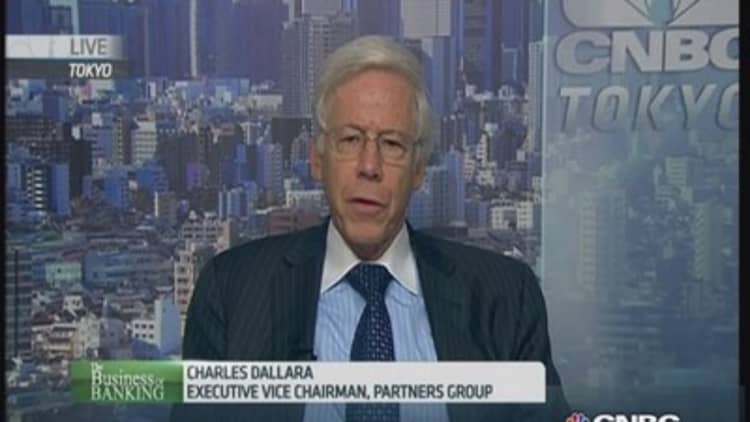A sign in parchment above the locked door of Shanxi Platinum Assemblage Investment, written in calligraphy, reads "Honesty is fundamental". Until recently a police notice below it directed investors to report to the local station to submit evidence against the company.
In Taiyuan, capital of the central Chinese province of Shanxi, investors have rushed to branches of Platinum Assemblage in recent days as word spread that the company was unable to meet payouts on maturing investment products that had offered annual interest rates of 14-18 percent. Meanwhile, rumors swirled that executives had fled and branches in some cities had shut their doors.
The incident highlights financial risks lurking in the outer margins of China's shadow banking system, where high-yielding wealth management products blur into grey-market lending. A financial system in which the government refuses to tolerate defaults has also encouraged moral hazard among investors by creating an expectation that even risky credit carries an implicit guarantee.
"I have no idea where they put the money. I'm not really clear on the guarantee businesses. But they had a business licence on the wall," said an elderly man surnamed Wang wearing a mechanic's jacket and knit cap outside the company's locked doors.

State media estimates that more than Rmb100 million ($16 million) may be at risk in the collapse of Platinum Assemblage, a relatively tiny sum. But a series of similar incidents this year suggests China's slowing economy has created fertile ground for hucksters, as companies become increasingly desperate for funds amid a pullback in lending from banks as well as more mainstream non-bank lenders such as trust companies.
Read MoreChina's economy is slowing faster than you think: CFO
In March, depositors in Yancheng city, Jiangsu province, rushed to withdraw funds from rural co-operatives and were told that the institutions — which operate like banks but whose legal status exempt them from liquidity regulations — had lent out all the money. Analysts said many co-ops, which were created to lend to farmers, had in fact been investing in real estate.
It is not known how Platinum Assemblage invested clients' funds, but a large share of shadow banking funding flows into real estate, one of the few industries that, until recently at least, could deliver rates of return high enough to service loans at interest rates often exceeding 20 percent.
Local media reported that wealth management clients of another guarantee company, Henan Swiftly Soaring Investment, blocked a road in Xinxiang city, Henan province, on Sunday to protest against the lack of payout on similarly structured wealth management products. China Business News, a national newspaper, reported that much of that money was also used for property purchases. Swiftly Soaring could not be reached for comment.
More from Financial Times:
An active headache for fund managers
Oil price slide a mixed blessing for China
Flow of Opec petrodollars set to dry up
Late last year eight government agencies including the banking regulator, the central bank and the commerce ministry released a notice warning of rampant irregularities among non-financial guarantee companies.
"Problems with chaotic business are increasingly evident. A large number of non-financial guarantee companies are not engaged in guarantee business. They even engage in illegal deposit-taking, illegal fundraising, illegal wealth management and high-interest loans," the notice said.
As of last week, branches of Platinum Assemblage in Taiyuan were still operating. However, employees told investors the company was short on funds and that while it could still make monthly interest payments, it could not repay principal on maturing products. They pressed investors to roll over their investment, promising that principal would be paid before the May 1 holiday next year. By Sunday, the office's doors were locked from the outside and the police notice appeared on the door.
In interviews outside the police station, investors all said they had had little idea what they were buying into. A police officer recording investor complaints declined to comment.
Read MoreInvestors look east to China trading link
"The salesmen said the boss was a connected guy, that he had a fireworks factory and a hotel," said one man surnamed Liu, who had invested a total of Rmb54,000. "The salesmen were always showing us photos of the projects. Here a supermarket, there a hotel."

Still, investors can be forgiven for their lack of curiosity. Loan agreements stated that the investor "will not bear any risk" and that "all potential risk" would be borne by the borrower.
Platinum Assemblage is officially registered as a "non-financial guarantee company", a status experts say exists in a regulatory no-man's land that allows the company to avoid meaningful scrutiny.
The large number of agencies notionally responsible for regulating such institutions seems, in practice, to have led to no single agency taking responsibility.
Read MoreWill China's property market unravel in 2015?
"If it's a non-financial guarantee company then we have nothing to do with regulating it," said an official at the Shanxi Financial Affairs Office, who declined to leave his name. He directed inquiries to the Department of Commerce. An official at the department's administrative office said his agency was not responsible for non-financial guarantee companies.
In spite of the police notice, it remains unclear whether Platinum Assemblage acted unlawfully in any way by selling the investment products. Non-financial guarantee companies are allowed to serve as intermediaries between borrowers and lenders.
In documents viewed by the Financial Times, investors signed loan agreements with a borrower called Shaanxi Nongxin Wanjia Commercial Trading, accompanied by a letter of guarantee in which Platinum Assemblage promised to return principal to the lender if the borrower was unable to repay.
Still, online descriptions of Nongxin Wanjia indicate that it is the parent company of Platinum Assemblage, which if correct would mean that the company was in effect guaranteeing a loan to itself.
Read MoreChinese corruption worse, despite drive: Report
Nongxin Wanjia and Platinum Assemblage could not be reached for comment.
As they traipsed in the cold from the police station to the state petition office — the traditional though rarely successful channel for citizens to seek redress for grievances of all kinds — investors discussed how to spur the government into action.
"We're planning a protest outside the company office tomorrow morning. We're going to hold a big banner and block the road. Then the police will show up and the government will have to pay attention," said an investor surnamed Mi.

